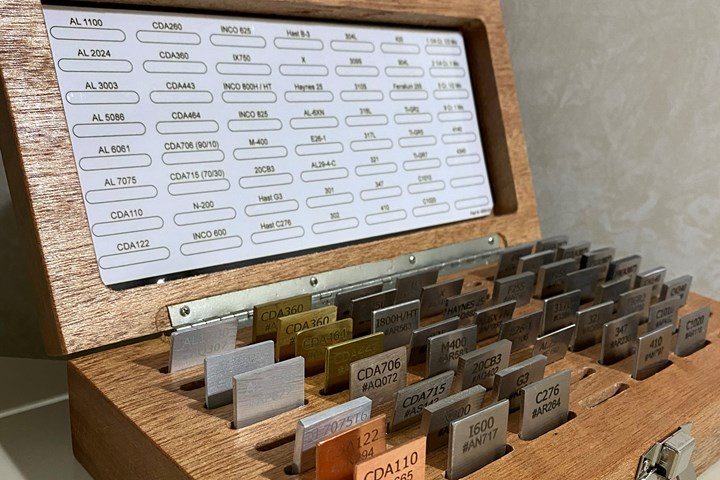XRF Service Provider Earns ISO 17034 Accreditation
Eastern Applied Research accreditations have recently expanded with the inclusion of coverage for ISO 17034.
Eastern Applied Research is a source of X-ray fluorescence (XRF) service and support which recently expanded its accreditation coverage. It includes coverage under ISO 17034 in addition to the ISO/IEC 17025 coverage which it has maintained for decades.
Associates from the company’s in-house standards laboratory and quality department worked through the ANSI National Accreditation Board (ANAB) to add the ISO 17034 accreditation because it is said to represent the gold standard in certified reference material (CRM) and reference material (RM) production.
The Eastern Applied Research quality department focused on the chemical composition category of ISO 17034 because its clients frequently use reference materials for alloy coatings and alloy verification. However, the company says it will potentially expand this accreditation further to cover additional reference materials as ISO 17034 has categories relating to inorganic reference materials, such as ores, cements and fuels, and others that may apply to XRF users.
For almost 20 years, the company has maintained accreditation for ISO/IEC 17025. This is a critical accreditation for users of X-ray fluorescence (XRF) because it relates to the certification of coating thickness standards and equipment, the company says. Coating thickness measurements are a primary use of XRF technology.
However, in recent years, Eastern Applied Research’s in-house standards laboratory has seen an increase in requests relating to compositional reference materials. This is a result of two factors, one factor being the increased use of alloy coatings such as zinc nickel (ZnNi), electroless nickel (ENi) related and solders (SnPb). The second factor is the increased use of handheld XRF analyzers for alloy verification. The accreditation for ISO 17034 (Category A) relates to steels, so certification of those materials can be handled through the in-house standards laboratory.
The main title of ISO 17034 refers to reference material producer/providers (RMP) and the specific accreditation is covered under Category A, Chemical Composition. By adding this accreditation, Eastern Applied Research is able to certify composition standards used in the operation of XRF analyzers. The accreditation also covers procedures in creating things such as labels, documentation and more.
“While adding this ISO 17034 accreditation opens new doors for Eastern Applied, it was really driven by what our current clients needed,” says Shawn Kramer, Eastern Applied Research president. “With the increased use of alloy coatings in metal finishing and the growth of handheld XRF services, we know that current customers will look to us as a reliable provider of reference materials and certifications, and the addition of ISO 17034 assures them that we will meet their expectations.”
The goal of any accreditation is to provide the customer with confidence that the provider they choose has the technical competence to meet specific guidelines that apply to their processes. ISO 17034 accreditation enables reference material providers to demonstrate this by complying with international criteria, helping assure the quality of reference material produced or its certification procedures.
In addition to covering requirements in CRM production, this accreditation provides confidence in labeling and assignment of property values to materials, including stability and homogeneity determinations. While ISO 17034 specifies general requirements for RMP operations, specific levels of accuracy are required for each reference material appropriate to its intended purpose (appropriate measurement uncertainty).
Related Content
BYK-Gardner Offers Protective Coatings Field Test Kit
New field kit includes tools for a proper assessment of environmental conditions prior to coating applications and film thickness evaluation.
Read MoreMastering Uniformity Through Surface Prep Standardization
By standardizing surface preparation processes and adopting surface energy measurement, a company can achieve uniformity, quality and cost reduction.
Read MoreCorrosion Resistance Testing for Powder Coating
Salt spray can be useful to help compare different pretreatment methods and coatings but it does not tell us much about the corrosion resistance of a part over time in the field. Powder coating expert Rodger Talbert offers insights into how to get a better idea of how to improve a part’s corrosion resistance in the real world.
Read MoreNASF/AESF Foundation Research Project #121: Development of a Sustainability Metrics System and a Technical Solution Method for Sustainable Metal Finishing - 12th Quarterly Report
This NASF-AESF Foundation research project report covers the twelfth quarter of project work (January-March 2023) at Wayne State University in Detroit. In this period, our main effort concentrated on documenting technical content that was yet to be reported, including analysis of costs for specific technologies for sustainability improvement.
Read MoreRead Next
Episode 45: An Interview with Chandler Mancuso, MacDermid Envio Solutions
Chandler Mancuso, technical director with MacDermid Envio discusses updating your wastewater treatment system and implementing materials recycling solutions to increase efficiencies, control costs and reduce environmental impact.
Read MoreA ‘Clean’ Agenda Offers Unique Presentations in Chicago
The 2024 Parts Cleaning Conference, co-located with the International Manufacturing Technology Show, includes presentations by several speakers who are new to the conference and topics that have not been covered in past editions of this event.
Read MoreDelivering Increased Benefits to Greenhouse Films
Baystar's Borstar technology is helping customers deliver better, more reliable production methods to greenhouse agriculture.
Read More









.jpg;maxWidth=300;quality=90)















